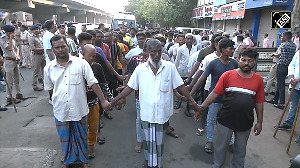In a significant policy shift, Afghanistan President Hamid Karzai has agreed to send a group of military officers to Pakistan for training, a decision which could raise eyebrows in India.
An agreement has been worked out confirmed Rangin Dadfar Spanta, Karzai's national security adviser, who said under it a "limited" number of officers would be sent for the training. The new deal comes on the heels of recent high-level contacts between the two countries.
"The move is a victory for Pakistan, which seeks a major role in Afghanistan as officials in both the countries become increasingly convinced that the United States' war effort there is faltering," The Washington Post reported on Thursday.
"This is meant to demonstrate confidence to Pakistan, in the hope of encouraging them to begin a serious consultation and conversation with us on the issue of the Taliban," Spanta was quoted as saying.
Though the number of Afghan officers is said to be between a handful and a few dozen, but it has enormous symbolic importance as the first tangible outcome of talks between Karzai and Pakistan's military and intelligence chiefs that began in May, the daily said.
"It is likely to be controversial among some Afghans who see Pakistan as a Taliban puppet-master rather than as a cooperative neighbor, and in India, which is wary of Pakistan's intentions in Afghanistan," the Post said.
Some key US officials involved in Afghanistan said they knew nothing of the arrangement. "We are neither aware nor have we been asked to facilitate training of the Afghan officer corps with the Pakistani military," Lt Gen William B Caldwell IV, head of the NATO training command in Afghanistan, said.
He said, Afghanistan "is a sovereign nation and can make bilateral agreements with other nations to provide training."
US has spent $ 27 billion to train and equip Afghan security forces since 2002 and US President Barack Obama's war strategy calls for doubling the strength of both the army and police force by 2011 to facilitate the gradual withdrawal of the US troops.
The surprise development comes after reports that top Pakistan army brass including Army Chief Gen Ashfaq Parvez Kayani and Inter Services Intelligence Chief Lt Gen Shuja Pasha recently made a number of visits to Kabul and had meetings with President Karzai.
More than 300 Afghan army officers are currently being trained under bilateral agreements in other countries, including Turkey and India, the Post said.
The paper said that Pakistan had been pushing for months for a training deal and a senior Pakistani government official said that the training programme was expected to begin "soon".
But, the paper said fears of Pakistani military influence persist among Afghan ethnic minorities and some in Karzai's government, including one official who compared the training initiative to the Soviet education of Afghan officers in 1960s and 70s that he said was "the start of all evil in Afghanistan".
US officials, the report said, were worried that Pakistanis' appeared wanting "a cleaning of the house" of Afghan army, which is currently dominated by ethnic Tajiks, whom Pakistan sees as hostile to its interest.
Meanwhile, in an interview to the PBS News Hour, Special US Representative for Pakistan and Afghanistan Richard Holbrooke said that of late there has been high-level contacts between the two countries, which has significantly improved their relationship.
"In recent weeks and months, almost unnoticed by the American media, there's been an increasing intensity of direct contacts between the governments of Pakistan and the governments of Afghanistan," Holbrooke had said.
"They haven't come to any final conclusion. Some of the reporting has been quite wild on this," Holbrooke also said.
"But the bottom line is that there's a more of a dialogue, encouraged by us. The US is working closely with President Karzai. And the Pakistanis understand what we're doing. I'm not here to say that something very dramatic and secret is going on. But it's out there in plain view. It just hasn't been reported," he said.
"General Kayani went to Kabul, barely mentioned in the Western press. President Karzai went not only to Islamabad, but to New Delhi, Beijing, and Washington and Tokyo. These contacts are significantly narrowing the gap, the historic gap, which is over 60 years old, between Afghanistan and Pakistan," Holbrooke said.
"Please remember -- that, on the day Pakistan declared independence, Afghanistan opposed its entry into the United Nationsa in 1947. They have a disputed border. They share a Pashtun ethnic group. There are massive historical issues here," he added.







 © 2025
© 2025